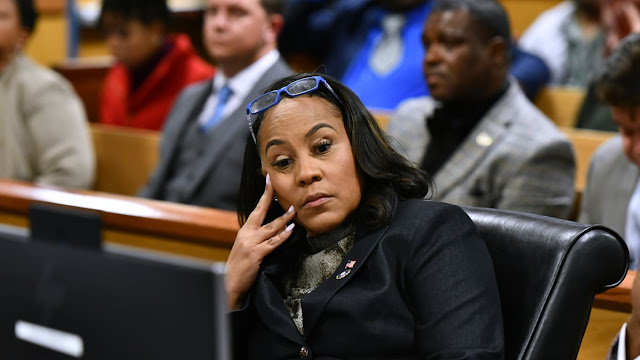Robin Yeartie testified that she saw Fani Willis and Nathan Wade “being affectionate” before November 2021. Wade said the relationship started in 2022.
Fulton County District Attorney's Relationship Timeline Challenged in Trump Election Interference Case
In a recent hearing related to the Trump election interference case, the Fulton County district attorney, Fani Willis, faced allegations about her personal relationship with Nathan Wade, the special prosecutor. Testimony from a former longtime friend of Willis contradicted the claimed timeline of their relationship. This article explores the revelations made during the hearing and their potential impact on the case against former President Trump.
Fani Willis, the Fulton County district attorney, and Nathan Wade, the special prosecutor in the Trump election interference case, reportedly began a personal relationship in late 2019, according to testimony from Robin Yeartie, a close friend of Willis. Yeartie, who had briefly worked at the district attorney's office, stated that Willis informed her about meeting Wade at a conference in October 2019. Furthermore, Yeartie claimed to have witnessed their affectionate behavior before November 2021, when Willis appointed Wade as the special prosecutor. Notably, Yeartie mentioned that she had also briefly accommodated Willis at her condo.
These revelations cast doubt on the official timeline provided by Wade and Willis, who maintain that their relationship started in 2022. Wade, appearing in court wearing a gray suit adorned with an American flag pin, asserted that their relationship began in early 2022 and denied any social discussions regarding their personal connection. He emphasized their preference for privacy while clarifying that their relationship was not a secret.
Wade later disclosed that his relationship with Willis ended in the summer of 2023 but maintained that they remained close friends. During the hearing, Wade was asked about any ongoing personal relationship, to which he responded that they were "very good friends" but denied any sexual involvement.
Willis herself testified, corroborating the timeline provided by Yeartie. While she acknowledged that their romantic relationship had ended several months prior, she expressed her belief that they would remain friends for life.
The ongoing hearing revolves around a motion filed by Ashleigh Merchant, an attorney representing former Trump aide and co-defendant Mike Roman. The motion alleges that Willis misused her office by engaging in an "improper" relationship with Wade, which included luxurious trips funded by the special prosecutor's taxpayer-funded salary.
The case against former President Trump in Georgia is considered one of the strongest, relying on recorded calls, paperwork, and testimony from flipped witnesses that allegedly document Trump's concerted efforts to manipulate the state's 2020 presidential election results.
Willis initiated the investigation on her first day in office after The Washington Post revealed Trump's phone call pressuring Georgia's top election official to "find 11,780 votes" to overturn his election loss in the state. The comprehensive inquiry culminated in August 2023 with a 41-count indictment against Trump and 18 others. However, the prosecution faced delays as the defendants attempted unsuccessfully to separate and transfer the case to different courts.
In the lead-up to the hearing, Merchant accused Willis and Wade of providing false information regarding their relationship timeline. Merchant also teased forthcoming bombshell testimony and brought up Wade's ongoing divorce, aiming to shed light on any potential improprieties associated with their romantic involvement.
During the hearing, Wade explained that he had used his credit card to book their trips as Willis preferred to limit her transactions for safety reasons. He clarified that Willis would reimburse him with cash or cover other expenses to maintain fairness during their travels.
Tensions surrounding the hearing were evident when Merchant informed the judge that Wade had refused to accept her subpoena. She also alleged that the DA's office had withheld evidence pertaining to their romantic relationship. While some requested records had been provided by the DA and county, a few crucial items, including two of Wade's invoices, were conspicuously missing.
Yeartie's testimony followed the refusal of Wade's former law partner, Terrence Bradley, to answer questions about the relationship timeline. Bradley cited attorney-client privilege and requested the court's certification for immediate review by the Georgia Supreme Court.
Merchant contended that Wade's representation of the relationship's start in his affidavit constituted a waiver of privilege. She argued that exceptions to attorney-client privilege, such as fraud, could be applicable in this case. However, an attorney from the DA's office accused Merchant of misrepresenting Bradley's intended testimony and requested sanctions against her.
Conclusion: The ongoing hearing in the Trump election interference case has raised questions about the relationship timeline between Fulton County District Attorney Fani Willis and special prosecutor Nathan Wade. Testimony from a former friend contradicted the claimed timeline, potentially impacting the case against former President Trump. As the hearing continues, additional evidence and witness testimonies may shed further light on the alleged improprieties surrounding their relationship.



